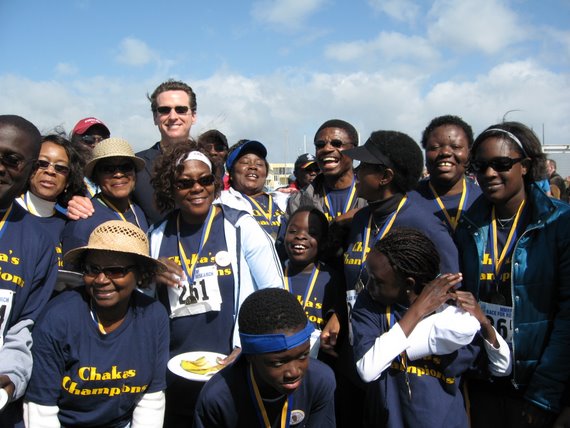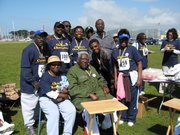|
Bob Geldof called it a "victory for millions of Africans". Newspaper editorials said it would go down in history as a "great day". But what has writing off $72 billion worth of debt done for those who live in the poorest countries? When the G8 summit at Gleneagles, Scotland, in July last year cancelled the debt of 18 of the poorest countries in the world - 14 of them in Africa - many raised a glass in celebration. The historic decision came hot on the heels of the Live 8 concerts, when the great and the good of pop, rock and rap played live around the world to put pressure on the G8 leaders to "Make Poverty History". Then there was the loud and colourful march on Gleneagles, organised by Geldof, with protesters waving banners that demanded "Action on poverty now!"
Feeling the heat of public demand, backed up by the pop world's anti-poverty soundtrack, the leaders of the eight wealthiest nations on earth announced on 8 July that debts amounting to $72 billion would be written off. The G8 leaders also agreed to boost aid to developing countries by $50 billion. Special Report: Africa After the Promises So how is debt relief working out for those who live in the poorest countries? Do they feel like they have won a "victory"? "Not at all, we're still poor and we still have to do what the international institutions tell us to do," says DeRoy Kwesi Andrew, a science teacher and filmmaker from Accra in Ghana. Mr Andrew has spent the past year working on a documentary called Damned by Debt Relief, in association with the London-based youth education charity WorldWrite. Over the next month he will be touring the film around Britain. Damned Pre-Gleneagles, Ghana had been in debt to the tune of $6 billion to institutions like the World Bank and the International Monetary Fund. The pressure on such a poor country to pay back so much money was seriously stifling development. At Gleneagles, Ghana had a huge chunk of its debt - $4.2 billion - written off forever. Surely that is a good thing? Andrew says it "sounds good" but the reality is rather different. Debt relief only focuses on "fixing the problems of the past", rather than investing in a better future, he says.
"Debt relief gives poor countries no real new money or resources. All those billions of dollars in debt relief - it sounds like a lot, but it will be paid by G8 governments into the vaults of the World Bank and others over the next few years. We won't see it. "What happened, in real terms, is that the leaders of G8 helped out their friends in the international banks. I didn't benefit. My friends and family in Ghana didn't benefit." Mr Andrew knows only too well the hardships of poverty. He grew up in Yiwabra, a village in the Aowin Suaman district in the Western Region of Ghana. His parents were peasant cocoa farmers who walked five miles to work each morning and used axes, hoes and machetes to farm the land. "You should see what it did to them", he says. "They became old, injured, tired." His family of six lived in a "mud house, roofed with thatches", which was not connected to any electricity grid. "We used candles and cooked by fire." Drudgery It was only because Mr Andrew did well at local schools that he managed to get to Accra - "a city full of the colours of life, but also full of drudgery and stress", he says. His family still farms cocoa. Andrew says people in Ghana want real, meaningful development. "We want houses made from cement with zinc roofing. Then they won't collapse in the heavy rains, which can kill people. We want combine harvesters so we don't have to bend down with cutlasses to do the farming. We want everything you have." Yet the debt relief programme signed off at Gleneagles comes with strict conditions that deny Ghanaians the right to decide how to develop, he says.
For example, as part of the deal to have its debt written off Ghana is forbidden from investing in the productive base of its economy; instead it must implement small-scale "poverty reduction" measures that only help people "in incremental ways", says Mr Andrew. In his film, various Ghanaian academics, journalists, activists and workers give their views on debt relief. Kwesi Pratt Jnr, an investigative journalist in Accra, says in the film that G8 is effectively telling Ghana "how to invest". "No country in the West would accept that another country should be determining its priorities and how it spends its money. It is arrogant and insulting", he says. 'Scandal' A spokesperson for Oxfam counters that the cancellation of 100% of some countries' debts was a "positive first step". "On the issue of trade, Gleneagles failed abysmally," he says. "On aid we got part of what we asked for, but the cancellation of debt relief was the one really big leap that occurred." Caroline Pearce, policy coordinator for the Jubilee Debt Campaign (JDC), also argues that complete debt relief for some countries can only be a good thing. JDC has been at the forefront of recent efforts to cancel what it calls the "scandal" of debt in developing countries, where "the world's most impoverished countries are forced to pay over $100 million every day to the rich world in debt repayments, while poverty kills millions of their people".
JDC started life as the Jubilee 2000 campaign in the 1990s, when it gathered a whopping 24 million signatures on a petition calling for debt cancellation - the largest ever petition. "People are really exercised by this issue, and that showed last year in the run-up to Gleneagles", says Ms Pearce. Yet she is also concerned about the conditions attached to the post-Gleneagles debt relief programmes. "No one claims debt relief is the solution, but it is a start," she says. "On its own it doesn't address the broader relations of economic injustice between the North and South. "We are worried about the conditions attached to debt relief, which is why our latest campaign is called 'Cut the Strings'. We don't want any strings attached to writing off unjust debts. "It is completely undemocratic for international financial institutions to tell poor countries how to spend their money. We should give Africa the room to be what it wants to be." |
Posted by: Yaw A. Owusu







